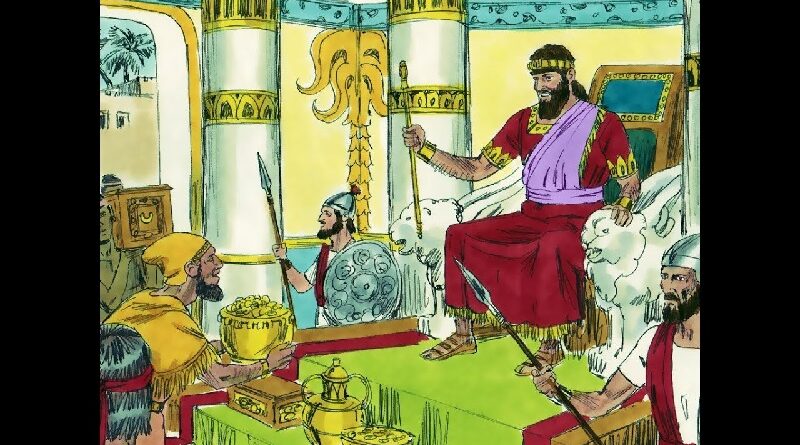The story of the reign of manasseh – मनश्शे के शासनकाल की कहानी
The story of the Reign of Manasseh comes from the Bible, specifically in the Books of 2 Kings and 2 Chronicles. Manasseh was the king of Judah and is often remembered for his long and tumultuous reign, marked by both great wickedness and eventual repentance. His reign is a powerful lesson on the consequences of turning away from God and the possibility of redemption through sincere repentance.
Manasseh, son of the righteous King Hezekiah, ascended to the throne of Judah at the young age of 12. His father, Hezekiah, had been a devout king who restored the worship of God in Judah, destroyed idols, and led the nation with a heart devoted to the Lord. However, Manasseh’s reign, which lasted 55 years—the longest of any king in Judah—took a very different path.
Despite the godly legacy left by his father, Manasseh turned away from the ways of the Lord and led Judah into deep apostasy. He introduced idolatry on a massive scale, erecting altars to foreign gods throughout Judah, even placing them inside the sacred temple of the Lord in Jerusalem. He worshipped Baal and Asherah, as well as the host of heaven—essentially promoting astrology and the worship of celestial bodies.
Manasseh not only embraced pagan practices but also engaged in extreme forms of wickedness. He practiced witchcraft, divination, and consulted with mediums and spiritists, which were all detestable practices in the eyes of the Lord. He even went so far as to sacrifice his own son in fire, a horrific practice associated with the worship of the god Molech.
Under Manasseh’s leadership, Judah fell into moral and spiritual decay. His influence led the people to commit greater sins than the pagan nations God had driven out before them. The Lord sent prophets to warn Manasseh and the people of Judah, but the king refused to listen. He hardened his heart and continued in rebellion, leading his people further away from God.
Because of Manasseh’s persistent disobedience, God’s anger was kindled against Judah. He warned through His prophets that Judah would face destruction if they did not repent. Eventually, God allowed the Assyrian army to invade Judah. Manasseh was captured, bound in chains, and taken as a prisoner to Babylon. In this moment of despair and humiliation, the once-proud king realized the depth of his sin.
While in Babylonian captivity, Manasseh experienced a change of heart. He recognized the weight of his wrongdoings and earnestly sought the Lord in his distress. He humbled himself greatly before the God of his fathers and prayed for forgiveness. In His mercy, God heard Manasseh’s prayer and was moved by his genuine repentance. God allowed him to return to Jerusalem and restore his reign over Judah.
Once back in Jerusalem, Manasseh made significant changes. He removed the foreign idols, tore down the pagan altars, and restored the altar of the Lord in the temple. He commanded the people of Judah to worship the Lord alone. Though the scars of his earlier reign could not be entirely undone, Manasseh tried to restore true worship and reverse some of the damage he had caused.
Despite Manasseh’s repentance, his earlier sins had left a deep mark on Judah. Many of the people continued in their idolatry even after the king’s reforms. While Manasseh ended his reign on a more faithful note, the spiritual decline he had initiated contributed to the eventual downfall of Judah. After his death, his son Amon reverted to the wicked practices of his father’s early years, and it was only under the reign of his grandson, Josiah, that a true reform would take place.
Manasseh’s story is one of both warning and hope. It highlights the grave consequences of leading a nation into sin but also reveals the boundless mercy of God, who is willing to forgive even the most wicked when they genuinely repent. His reign stands as a reminder that no matter how far one falls, God’s grace is still available to those who turn back to Him with a humble heart.
Manasseh’s reign demonstrates how far-reaching the effects of idolatry and wickedness can be, leading not only to personal consequences but also to national destruction. Despite his grave sins, Manasseh’s sincere repentance in captivity shows that no one is beyond the reach of God’s mercy if they truly humble themselves. Manasseh’s early years of rebellion left a lasting impact on Judah, showing that the influence of a leader can have long-term consequences, even after they repent.
The story of Manasseh teaches us that, while sin may lead to judgment, God’s mercy and willingness to forgive are greater than any human failure.
The story of the reign of manasseh – मनश्शे के शासनकाल की कहानी



